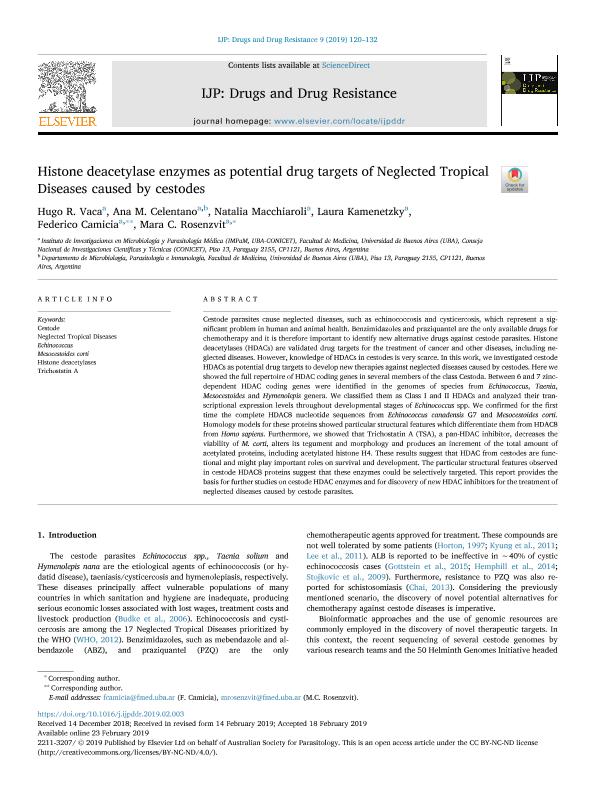Artículo
Histone deacetylase enzymes as potential drug targets of Neglected Tropical Diseases caused by cestodes
Vaca, Hugo Rolando ; Celentano Stanic, Ana Maria Luisa Micaela; Macchiaroli, Natalia
; Celentano Stanic, Ana Maria Luisa Micaela; Macchiaroli, Natalia ; Kamenetzky, Laura
; Kamenetzky, Laura ; Camicia, Federico
; Camicia, Federico ; Rosenzvit, Mara Cecilia
; Rosenzvit, Mara Cecilia
 ; Celentano Stanic, Ana Maria Luisa Micaela; Macchiaroli, Natalia
; Celentano Stanic, Ana Maria Luisa Micaela; Macchiaroli, Natalia ; Kamenetzky, Laura
; Kamenetzky, Laura ; Camicia, Federico
; Camicia, Federico ; Rosenzvit, Mara Cecilia
; Rosenzvit, Mara Cecilia
Fecha de publicación:
04/2019
Editorial:
Elsevier
Revista:
International Journal for Parasitology: Drugs and Drug Resistance
ISSN:
2211-3207
e-ISSN:
2211-3207
Idioma:
Inglés
Tipo de recurso:
Artículo publicado
Clasificación temática:
Resumen
Cestode parasites cause neglected diseases, such as echinococcosis and cysticercosis, which represent a significant problem in human and animal health. Benzimidazoles and praziquantel are the only available drugs for chemotherapy and it is therefore important to identify new alternative drugs against cestode parasites. Histone deacetylases (HDACs) are validated drug targets for the treatment of cancer and other diseases, including neglected diseases. However, knowledge of HDACs in cestodes is very scarce. In this work, we investigated cestode HDACs as potential drug targets to develop new therapies against neglected diseases caused by cestodes. Here we showed the full repertoire of HDAC coding genes in several members of the class Cestoda. Between 6 and 7 zinc-dependent HDAC coding genes were identified in the genomes of species from Echinococcus, Taenia, Mesocestoides and Hymenolepis genera. We classified them as Class I and II HDACs and analyzed their transcriptional expression levels throughout developmental stages of Echinococcus spp. We confirmed for the first time the complete HDAC8 nucleotide sequences from Echinococcus canadensis G7 and Mesocestoides corti. Homology models for these proteins showed particular structural features which differentiate them from HDAC8 from Homo sapiens. Furthermore, we showed that Trichostatin A (TSA), a pan-HDAC inhibitor, decreases the viability of M. corti, alters its tegument and morphology and produces an increment of the total amount of acetylated proteins, including acetylated histone H4. These results suggest that HDAC from cestodes are functional and might play important roles on survival and development. The particular structural features observed in cestode HDAC8 proteins suggest that these enzymes could be selectively targeted. This report provides the basis for further studies on cestode HDAC enzymes and for discovery of new HDAC inhibitors for the treatment of neglected diseases caused by cestode parasites.
Archivos asociados
Licencia
Identificadores
Colecciones
Articulos(IMPAM)
Articulos de INSTITUTO DE INVESTIGACIONES EN MICROBIOLOGIA Y PARASITOLOGIA MEDICA
Articulos de INSTITUTO DE INVESTIGACIONES EN MICROBIOLOGIA Y PARASITOLOGIA MEDICA
Citación
Vaca, Hugo Rolando; Celentano Stanic, Ana Maria Luisa Micaela; Macchiaroli, Natalia; Kamenetzky, Laura; Camicia, Federico; et al.; Histone deacetylase enzymes as potential drug targets of Neglected Tropical Diseases caused by cestodes; Elsevier; International Journal for Parasitology: Drugs and Drug Resistance; 9; 4-2019; 120-132
Compartir
Altmétricas



